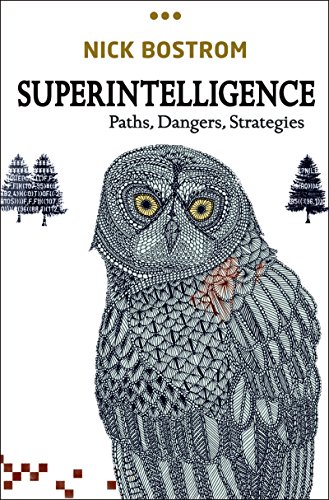18 Best-Selling Artificial Intelligence Books Millions Trust
Recommended by Bill Gates, Satya Nadella, Elon Musk — top experts guiding your AI reading journey






There's something special about books that both experts and millions of readers trust to understand Artificial Intelligence. Today, AI is reshaping every corner of society—from industry to ethics, from technology to governance—making these books more relevant than ever. Whether you're curious about AI's future risks or its practical applications, these titles encapsulate proven insights and popular wisdom.
Bill Gates, co-founder of Microsoft, has repeatedly highlighted works like Superintelligence and The Singularity Is Nearer for their profound analysis of AI's risks and promises. Meanwhile, Satya Nadella, Microsoft’s CEO, emphasizes Competing in the Age of AI for its sharp leadership strategies in AI-driven business. Elon Musk, known for his forward-thinking ventures, underscores the importance of understanding AI safety through books like Our Final Invention.
While these popular books provide frameworks validated by experts and readers alike, those seeking a tailored learning experience can consider creating a personalized Artificial Intelligence book that combines these proven approaches with your unique background, interests, and goals. This way, you can dive deeper into what matters most to you.
Recommended by Bill Gates
Co-Founder & Former CEO of Microsoft
“I highly recommend this book”
by Nick Bostrom··You?
by Nick Bostrom··You?
Drawing from his extensive background in philosophy, theoretical physics, and artificial intelligence, Nick Bostrom explores what happens when machines surpass human intelligence. You’ll gain insight into the potential paths toward superintelligence, the risks involved, and the strategic decisions humanity faces. The book offers detailed discussions on topics like the intelligence explosion and control challenges, providing frameworks to think critically about AI’s future. If you want to understand the profound implications of AI development and the ethical questions it raises, this book lays out the intellectual terrain with clarity and depth.
Recommended by K Ken Nakamura
Science aficionado and stats expert
“I read this great book by @tegmark Highly recommended for all future generation, for everyone should think about AI. Thus in my opinion, since everyone should know about AI, the first half of the book should be required reading in high school.” (from X)
by Max Tegmark··You?
by Max Tegmark··You?
What if everything you knew about the future of technology was wrong? Max Tegmark, an MIT professor deeply involved in AI safety research, explores how artificial intelligence could reshape society, jobs, and even human identity itself. You’ll gain insights into ethical dilemmas like autonomous weapons, the impact of automation on income and purpose, and how to design AI systems that align with human values. Chapters dissect scenarios ranging from AI-driven prosperity to existential risks, providing a nuanced view that challenges simplistic fears or hype. If you’re curious about AI’s potential consequences and want to engage thoughtfully with its promises and perils, this book offers a grounded, wide-ranging perspective.
by TailoredRead AI·
by TailoredRead AI·
This tailored AI Mastery Blueprint explores the dynamic landscape of artificial intelligence applications, focusing on battle-tested approaches refined through widespread reader validation. It examines key AI concepts and practical uses, combining foundational knowledge with personalized insights that resonate with your unique background and goals. By addressing the specific areas you want to develop, this book reveals techniques and methods that have proven valuable to millions, making your learning journey both focused and efficient. The tailored content ensures that you engage deeply with topics that matter most, fostering a comprehensive understanding of AI mastery shaped around your interests.
Recommended by Sean Carroll
Physicist at Caltech and SFI, podcast host
“Computers are capable of feats of astonishing intelligence, while at the same time lacking any semblance of common sense. Melanie Mitchell takes us through an enlightening tour of how artificial intelligence currently works, and how it falls short of true human understanding.”
by Melanie Mitchell··You?
by Melanie Mitchell··You?
What makes this book intriguing is how Melanie Mitchell, a computer scientist with a Ph.D. from the University of Michigan and co-creator of the Copycat program, unpacks artificial intelligence beyond the hype. She offers clear explanations of how AI systems like neural networks and natural language processors actually function, and where they fall short of human understanding. You’ll gain insight into key AI models, the history of AI development, and the nuanced challenges ahead, including whether machines can truly think or just simulate intelligence. This book suits anyone curious about what AI really does today and the realistic prospects for its future.
Recommended by Caroline Mccarthy
VP at Truex, TED Resident, Former Google
“If your 2020 resolutions involve more reading, the book I recommended to the most people in 2019 -- and continue to do so -- is Amy Webb's THE BIG NINE. An essential primer on AI and the US-China tech rivalry. (It is a must for the entire Yang Gang btw.)” (from X)
Amy Webb, a professor of strategic forecasting at NYU Stern, wrote this book to expose how a handful of tech giants wield AI in ways that could shape humanity's future without public oversight. You learn to recognize the invisible power dynamics embedded in AI systems developed by companies like Amazon, Google, and Tencent, and the risks of ceding control to these 'Big Nine' players. The book walks you through the ethical dilemmas and unintended consequences of AI driven by profit motives rather than human values, especially the emerging US-China tech rivalry. This is a crucial read if you're concerned about AI governance, corporate influence, or the societal impact of intelligent machines.
Recommended by Fareed Zakaria
Author of Ten Lessons for a Post-Pandemic World
“Absolutely masterful.”
by Henry A Kissinger, Eric Schmidt, Daniel Huttenlocher··You?
by Henry A Kissinger, Eric Schmidt, Daniel Huttenlocher··You?
Unlike most AI books that focus solely on technical advances, this one brings together Henry Kissinger's vast diplomatic experience with Eric Schmidt's technology leadership and Daniel Huttenlocher's academic insights to examine how AI reshapes society, governance, and knowledge itself. You gain a nuanced understanding of AI's impact beyond algorithms — from misinformation challenges to ethical dilemmas and geopolitical shifts. Specific chapters explore AI's role in medicine, military, and culture, helping you grasp why control and accountability lag behind capability. If you want to see AI through a multidisciplinary lens that connects technology to human values, this book offers a thoughtful framework, though it’s less about coding and more about context and consequences.
by TailoredRead AI·
by TailoredRead AI·
This tailored book explores a carefully designed thirty-day plan to accelerate your AI knowledge and skills. It combines widely validated concepts with your unique interests, matching your background and specific goals to deliver focused content that feels relevant and engaging. The book examines foundational AI principles and progressively introduces more advanced topics, all paced to foster rapid competence. By concentrating on areas you find most compelling, it reveals a personalized path through the complex AI landscape, empowering you to build confidence and practical understanding within a month. This tailored approach transforms the learning journey into an efficient, enjoyable experience geared specifically for you.
Recommended by Satya Nadella
CEO of Microsoft
“Iansiti and Lakhani have written an important book that explains what's required to rethink the firm and become an AI-first company. Anyone interested in the impact of AI should read this book.”
by Marco Iansiti, Karim R. Lakhani··You?
by Marco Iansiti, Karim R. Lakhani··You?
The methods Marco Iansiti and Karim R. Lakhani developed while researching hundreds of AI-driven companies reveal how data and algorithms are reshaping business at a fundamental level. You learn to rethink organizational strategy and operations through a new lens where traditional limits on scale and scope no longer apply, as shown by examples from Airbnb to Microsoft. This book demystifies how AI-centric firms build competitive advantage by enabling more accurate predictions and continuous learning. If you're leading or advising companies facing digital transformation, it offers a clear framework to understand and navigate this evolving landscape. However, if you're seeking technical AI development details, this book focuses more on strategy and leadership than coding.
Recommended by Daniel Kahneman
Professor of Psychology, Nobel Laureate
“This is the most important book I have read in quite some time. It lucidly explains how the coming age of artificial super-intelligence threatens human control. Crucially, it also introduces a novel solution and a reason for hope.”
by Stuart Russell··You?
by Stuart Russell··You?
When Stuart Russell, a leading AI researcher at UC Berkeley, reexamines artificial intelligence, he challenges the assumption that smarter machines inevitably threaten human control. You’ll explore how current AI systems can be misguided by unclear human intentions and why this matters as AI capabilities grow. The book dives into designing AI to be uncertain about human preferences—making machines more deferential and aligned with our goals. Chapters detail both the promise of AI in accelerating science and the pitfalls, such as autonomous weapons and misuse. This is a must-read if you want to understand how AI might coexist with humanity rather than dominate it.
Recommended by Leilani Münter
Environmentalist and documentary filmmaker
“@opineno @jrbarrat IMHO “Our Final Invention” is one of the best books ever written on the dangers of AI. I had the pleasure of meeting James for the first time back in 2015, just after I read his book. James is also an accomplished documentary filmmaker.” (from X)
What happens when a documentary filmmaker turns his lens to the existential risks of artificial intelligence? James Barrat takes you through a cautionary tale that explores AI's rapid evolution toward surpassing human intelligence and the potential threats this poses. You gain insight into the AI control problem, the drive for strong AI, and the future scenarios that could unfold as machines become autonomous. Barrat profiles industry leaders and AI systems, highlighting the urgency of thoughtful oversight. This book suits anyone concerned with AI's societal impact—whether you're a technologist, policymaker, or curious thinker ready to confront the implications.
by Gary Marcus, Ernest Davis··You?
by Gary Marcus, Ernest Davis··You?
What happens when two seasoned AI researchers challenge the hype surrounding artificial intelligence? Gary Marcus and Ernest Davis draw on decades of experience to argue that the impressive feats of AI today, like winning Jeopardy!, fall short of true intelligence. They delve into why current systems struggle outside closed environments and propose a shift toward endowing machines with common sense and deeper understanding. You’ll find detailed discussions on bridging the gap between narrow AI and genuine human-like cognition, making this a thoughtful read if you want a clear-eyed view of AI’s future potential and limitations.
Recommended by Bill Gates
Co-Founder & Former Microsoft CEO
“Ray Kurzweil is the best person I know at predicting the future of artificial intelligence.”
by Ray Kurzweil··You?
by Ray Kurzweil··You?
What keeps drawing experts and readers alike to Ray Kurzweil’s latest work is his deep dive into how technology will reshape human life in profound ways. Kurzweil, a pioneer with decades of accurate AI predictions, explores tangible advancements such as nanobots rebuilding matter atom by atom, brain-cloud intelligence integration, and radical life extension. The book doesn’t shy from difficult questions, tackling AI’s impact on jobs and ethical dilemmas like "After Life" technology, which blends data and DNA to digitally resurrect individuals. You’ll find chapters grounding these ideas in real scientific progress and thoughtful projections, making it a solid read if you want a clear-eyed look at what’s on the horizon for AI and humanity.
by Nils J. Nilsson·You?
by Nils J. Nilsson·You?
Nils J. Nilsson, a pioneering figure in AI and computer science education, crafted this book to bridge theory and practical applications in artificial intelligence. You’ll explore foundational concepts like data structures and control strategies that power systems such as natural language processing and robotics, without getting lost in specific applications. This approach benefits those looking to understand the computational underpinnings of AI, especially students and professionals aiming to build or analyze intelligent systems. Chapters systematically dissect operations on data and control mechanisms, offering clarity on how AI programs function under the hood. If you want to grasp AI’s core principles rather than just its surface uses, this book delivers exactly that.
Recommended by Eric Horvitz
Microsoft Research President, AAAI leader
“Nils's book is a tour de force that serves as a valuable hiker's guide through the twists and turns of the historical trails of the first several decades of the quest for artificial intelligence.”
by Nils J. Nilsson··You?
by Nils J. Nilsson··You?
Nils J. Nilsson's decades of pioneering work in artificial intelligence culminate in this detailed historical account that traces the evolution of AI from early philosophical ideas to modern engineering feats. You gain an understanding of AI's foundational concepts, including game playing, computer vision, and natural language processing, supported by clear diagrams and chapter notes that link to seminal research. This book suits anyone curious about how AI technologies behind everyday tools like speech recognition and health-care robots actually function. While it offers a thorough chronology and technical insights, it’s best suited for those willing to engage with a deep dive into AI’s intellectual roots rather than quick practical applications.
by Manas Joshi··You?
by Manas Joshi··You?
What started as Manas Joshi's mission to demystify artificial intelligence has become a clear guide through AI's evolving landscape. Drawing on his experience in technology and education, Joshi walks you through foundational algorithms like neural networks and decision trees, unpacking their mechanics and real-world relevance. The book’s case studies illustrate AI’s impact across industries, while chapters on emerging trends prepare you to anticipate future shifts. Whether you’re a student or a professional, this concise 80-page journey sharpens your understanding and equips you to engage confidently with AI’s rapid advances.
by Alger Fraley·You?
What started as an effort to simplify the overwhelming world of artificial intelligence became a detailed guide that demystifies both foundational and advanced AI concepts. Alger Fraley takes you through everything from the basics of AI and deep learning to the intricacies of NLP, GANs, and ethical considerations, offering clear explanations and practical insights. For example, the book dedicates chapters to ethical AI practices and explores the future of human-AI collaboration through prompts and generative models. If you're eager to build a solid understanding of AI's scope and applications, this guide provides a structured path, though those seeking highly technical deep dives might want supplementary resources.
by GLORIA GIBSON·You?
Unlike most artificial intelligence books that focus solely on theory, Gloria Gibson's guide bridges foundational concepts with hands-on Python programming to build intelligent systems. You’ll explore supervised and unsupervised learning, dive into neural networks, and even develop chatbots, all illustrated with practical examples and fully functional code. The book breaks down complex topics like deep learning frameworks and ethical AI considerations, making it accessible whether you're just starting or deepening your expertise. If you want to move beyond abstract ideas and actually create AI applications across industries like healthcare or finance, this book delivers a clear pathway.
by Ray Kurzweil··You?
by Ray Kurzweil··You?
Drawing from his extensive background as a pioneering inventor and AI visionary, Ray Kurzweil challenges the conventional wisdom about how the mind operates by reverse-engineering the brain’s pattern recognition processes. You’ll explore detailed theories on how the brain functions, the emergence of consciousness, and the potential to replicate these mechanisms in machines, especially in chapters outlining the neocortex’s role. This book is particularly suited to anyone intrigued by the intersection of neuroscience and artificial intelligence, eager to grasp how human thought might inform future AI development. It doesn’t shy away from complex ideas but remains accessible enough to make you reconsider what intelligence truly means.
by José Antonio Bowen·You?
by José Antonio Bowen·You?
José Antonio Bowen's extensive experience in education and innovation led him to explore how AI is reshaping teaching and learning. In this book, you’ll learn specific strategies for integrating AI tools into classrooms, managing challenges like academic integrity, and fostering critical thinking skills in students. The text provides insights into adapting traditional education methods to a world where AI influences creativity and authorship. If you’re an educator or involved in learning design, this guide offers a grounded perspective on navigating the evolving landscape of AI-powered education.
by Huawei Technologies Co. Ltd.··You?
by Huawei Technologies Co. Ltd.··You?
Huawei Technologies, a global leader in ICT infrastructure, developed this book to map out the current landscape and significant advances in artificial intelligence technology. You’ll find it breaks down complex AI topics like machine learning, deep learning frameworks, and Huawei’s own MindSpore AI platform into approachable language, supported by clear examples and analysis. The book also covers practical AI applications across cloud computing, smart devices, and enterprise intelligence, making it particularly relevant if you're aiming to understand both foundational theories and cutting-edge industry implementations. While it assumes some technical curiosity, anyone seeking to grasp how AI is evolving in real-world technology environments will find this a useful guide.
Proven AI Strategies, Personalized for You ✨
Access expert-backed Artificial Intelligence methods tailored to your goals and background.
Trusted by thousands of AI enthusiasts and professionals
Conclusion
These 18 books reveal clear themes: a focus on AI's ethical and societal implications, deep dives into technical foundations, and practical strategies for leadership in an AI-driven world. If you prefer proven methods of understanding AI’s impact, Life 3.0 and Human Compatible offer thoughtful perspectives. For validated approaches to AI business transformation, combine Competing in the Age of AI with The Big Nine.
If you want to grasp AI’s history and fundamentals, The Quest for Artificial Intelligence and Principles of Artificial Intelligence serve as solid starting points. For those intrigued by AI’s future and risks, Superintelligence and Our Final Invention provide compelling insights.
Alternatively, you can create a personalized Artificial Intelligence book to combine these proven methods with your specific interests and learning style. These widely-adopted approaches have helped many readers navigate the complex world of AI with confidence.
Frequently Asked Questions
I'm overwhelmed by choice – which book should I start with?
Start with Artificial Intelligence by Melanie Mitchell for a clear, accessible overview of AI today. It balances technical insight with real-world examples, making it ideal for grounding your understanding before exploring specialized topics.
Are these books too advanced for someone new to Artificial Intelligence?
Not at all. Many books like The AI Expedition and Essentials of Artificial Intelligence are designed to introduce foundational concepts. They make complex ideas approachable, so beginners can build solid knowledge without feeling lost.
What's the best order to read these books?
Begin with accessible introductions like Artificial Intelligence and The AI Expedition. Then explore ethical and societal impacts with Life 3.0 and The Big Nine. For strategic insights, read Competing in the Age of AI and Superintelligence next.
Are any of these books outdated given how fast Artificial Intelligence changes?
While AI evolves rapidly, many of these books focus on enduring principles, ethical questions, and strategic frameworks that remain relevant. Newer titles like The Artificial Intelligence and Generative AI Bible provide updates on cutting-edge developments.
Can I skip around or do I need to read them cover to cover?
You can definitely skip around. These books cover different angles—some technical, others ethical or strategic—so choose chapters or titles that align with your current interests or goals without reading everything sequentially.
How can personalized AI books complement these expert recommendations?
Personalized AI books build on expert insights by tailoring content to your background, skill level, and specific interests. They help you focus on what matters most to you, making learning more efficient and relevant. Explore creating your custom AI book to combine proven approaches with your unique needs.
📚 Love this book list?
Help fellow book lovers discover great books, share this curated list with others!
Related Articles You May Like
Explore more curated book recommendations













![The Artificial Intelligence and Generative AI Bible: [5 in 1] The Most Updated and Complete Guide | From Understanding the Basics to Delving into GANs, NLP, Prompts, Deep Learning, and Ethics of AI book cover](https://m.media-amazon.com/images/I/510GlPAN6lL._SL500_.jpg)



